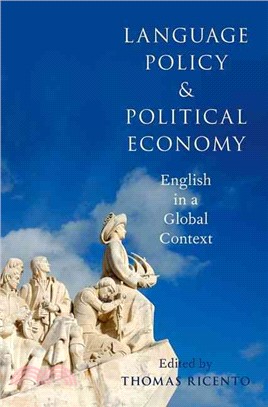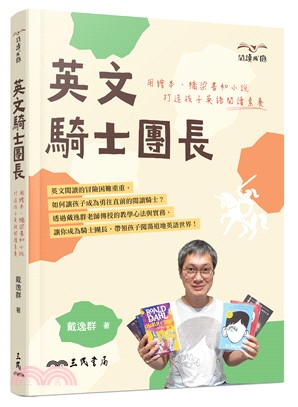Language Policy and Political Economy ─ English in a Global Context
商品資訊
ISBN13:9780190656737
出版社:Oxford Univ Pr
作者:Thomas Ricento (EDT)
出版日:2016/11/01
裝訂/頁數:平裝/336頁
規格:23.5cm*15.9cm*2.5cm (高/寬/厚)
定價
:NT$ 1670 元優惠價
:90 折 1503 元
無庫存,下單後進貨(到貨天數約30-45天)
下單可得紅利積點:45 點
商品簡介
作者簡介
相關商品
商品簡介
This volume articulates a new framework for language policy research that explores the connections between language policy and political economy. The chapters are united in their focus on English, a language that has enjoyed a reputation as a "global language" over the course of the last century and that is perceived as a tool for socioeconomic mobility. The book argues that adopting a new, political economic approach to language policy research will enhance our ability to provide more consistent explanations about the status, functions, benefits, and limitations of English in its various roles in non-English dominant countries.
The book poses the questions: Does English serve as a "lingua franca" and does it advance the interests of sustainable economic and social development in low-income countries? Written by leading experts in language policy research, the chapters reveal the myriad and complex ways in which government leaders, policymakers, and communities make decisions about the languages that will be taught as subjects or used as media of instruction in schools. English is often advertised as a social "good" with unquestioned instrumental value, yet access to quality English-medium education in low-income countries tends to be restricted to those with sufficient economic means to pay for it. As the capitalist world economy continues to change and grow, and assuming that translation technologies continue to improve, it is likely that the roles and relative importance of English as a global language will change significantly. Assessing the costs and benefits of acquiring English therefore takes on increased urgency. The book argues that a political economic approach is particularly appropriate in this endeavor, as it takes into account theories and empirical findings from a range of disciplines in order to assess and explain real-world phenomena that do not fit neatly into boxes labeled "economic," "social," "political" or "cultural."
Together, the chapters in this volume argue for a new direction in language policy studies-grounded in political economy -- that will explain why English has been experienced as both a blessing and curse in different parts of the world, why English continues to be useful as a lingua franca for particular sectors of the global economy, and why it is a detriment to economic development in many low-income countries. The book will be invaluable to language policy scholars, policy-makers, and educators, significantly advancing research in this important field.
The book poses the questions: Does English serve as a "lingua franca" and does it advance the interests of sustainable economic and social development in low-income countries? Written by leading experts in language policy research, the chapters reveal the myriad and complex ways in which government leaders, policymakers, and communities make decisions about the languages that will be taught as subjects or used as media of instruction in schools. English is often advertised as a social "good" with unquestioned instrumental value, yet access to quality English-medium education in low-income countries tends to be restricted to those with sufficient economic means to pay for it. As the capitalist world economy continues to change and grow, and assuming that translation technologies continue to improve, it is likely that the roles and relative importance of English as a global language will change significantly. Assessing the costs and benefits of acquiring English therefore takes on increased urgency. The book argues that a political economic approach is particularly appropriate in this endeavor, as it takes into account theories and empirical findings from a range of disciplines in order to assess and explain real-world phenomena that do not fit neatly into boxes labeled "economic," "social," "political" or "cultural."
Together, the chapters in this volume argue for a new direction in language policy studies-grounded in political economy -- that will explain why English has been experienced as both a blessing and curse in different parts of the world, why English continues to be useful as a lingua franca for particular sectors of the global economy, and why it is a detriment to economic development in many low-income countries. The book will be invaluable to language policy scholars, policy-makers, and educators, significantly advancing research in this important field.
作者簡介
Thomas Ricento is Professor and Research Chair at the University of Calgary, Canada. He has published widely in the field of language policy and on the politics of language in North America. He was a Fulbright Professor in Colombia (1989) and Costa Rica (2000), and a visiting professor at universities in Chile, Germany, Spain, , and Switzerland. He was Director of English Language Programs at the Japan Center for Michigan Universities, Hikone, Japan from 1989-1991.
主題書展
更多
主題書展
更多書展今日66折
您曾經瀏覽過的商品
購物須知
外文書商品之書封,為出版社提供之樣本。實際出貨商品,以出版社所提供之現有版本為主。部份書籍,因出版社供應狀況特殊,匯率將依實際狀況做調整。
無庫存之商品,在您完成訂單程序之後,將以空運的方式為你下單調貨。為了縮短等待的時間,建議您將外文書與其他商品分開下單,以獲得最快的取貨速度,平均調貨時間為1~2個月。
為了保護您的權益,「三民網路書店」提供會員七日商品鑑賞期(收到商品為起始日)。
若要辦理退貨,請在商品鑑賞期內寄回,且商品必須是全新狀態與完整包裝(商品、附件、發票、隨貨贈品等)否則恕不接受退貨。
























